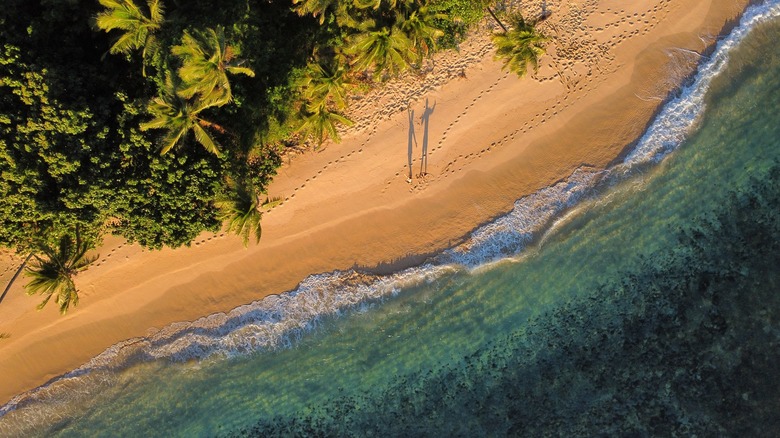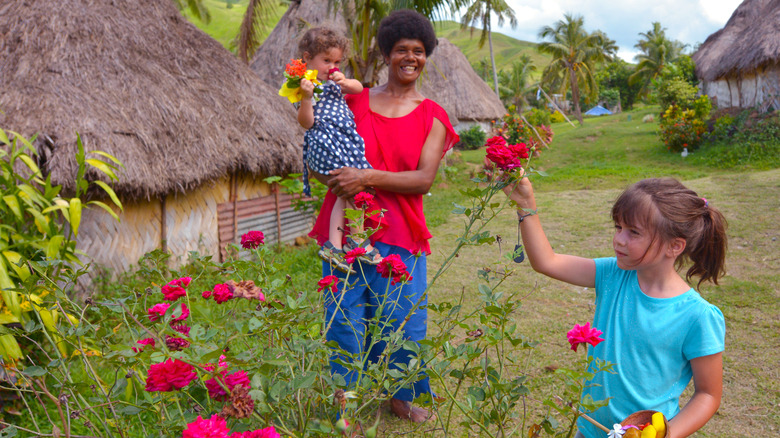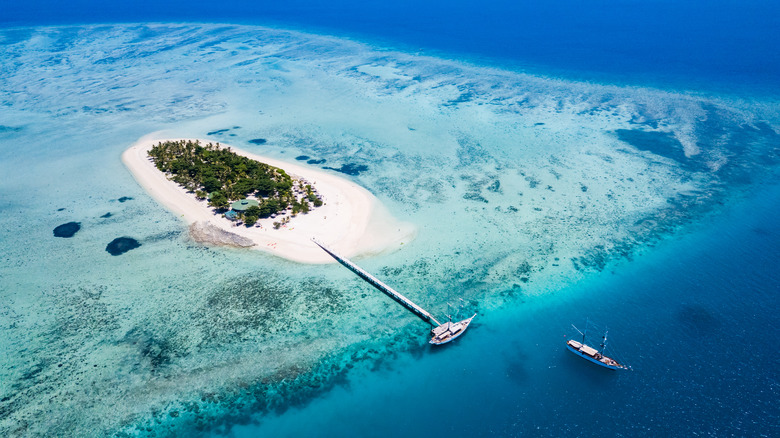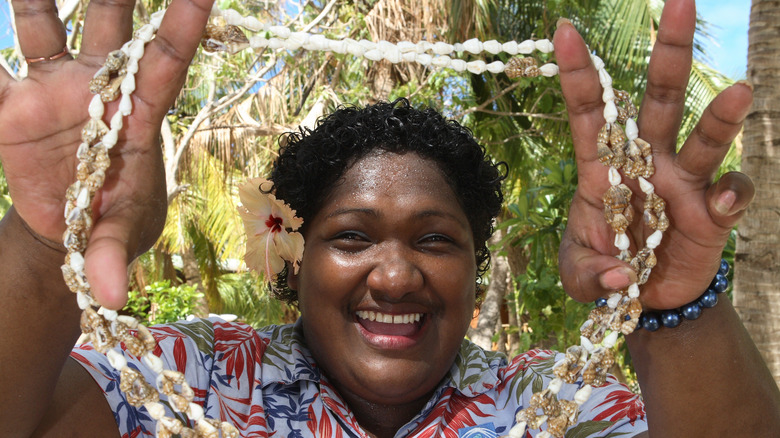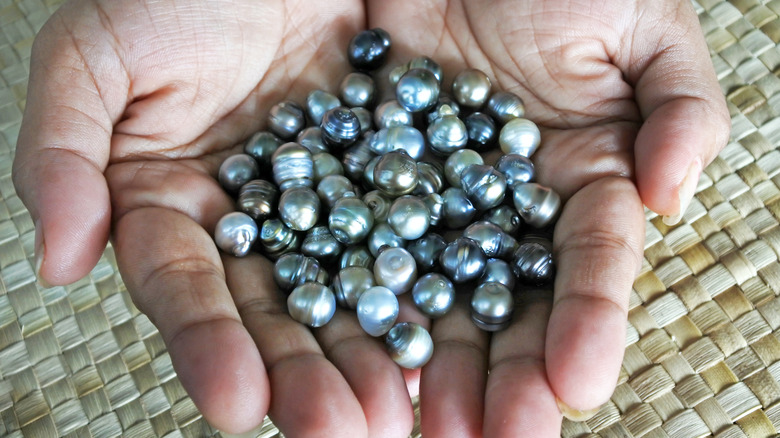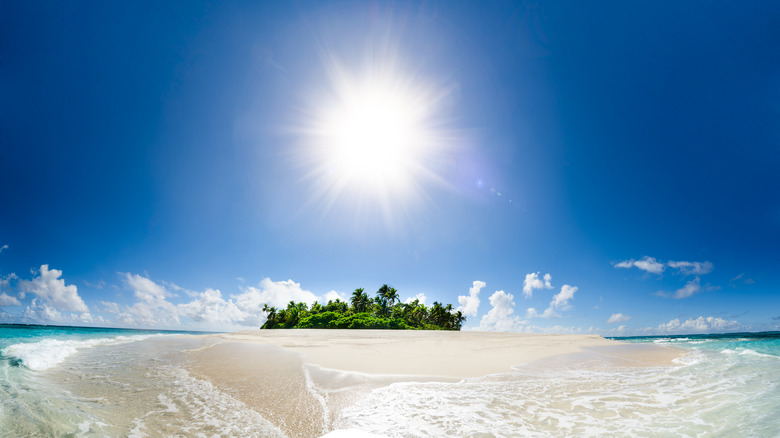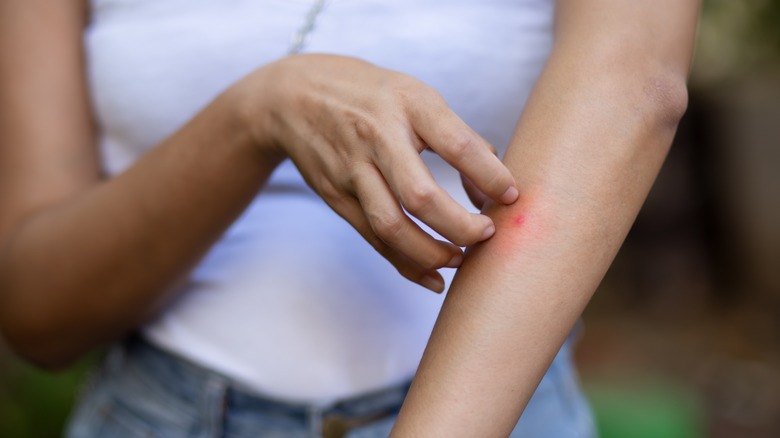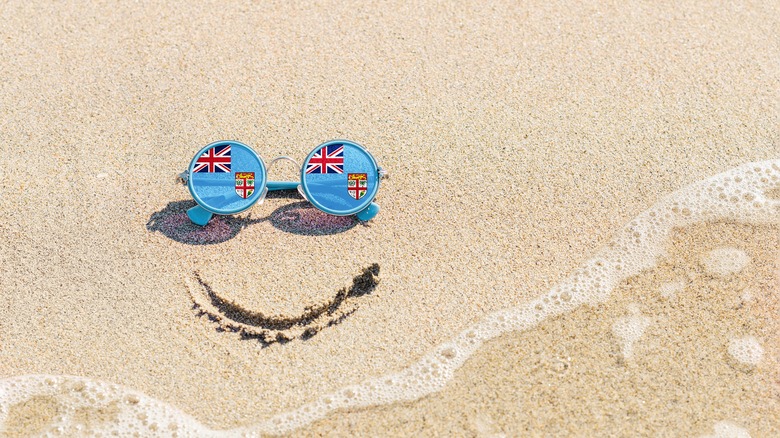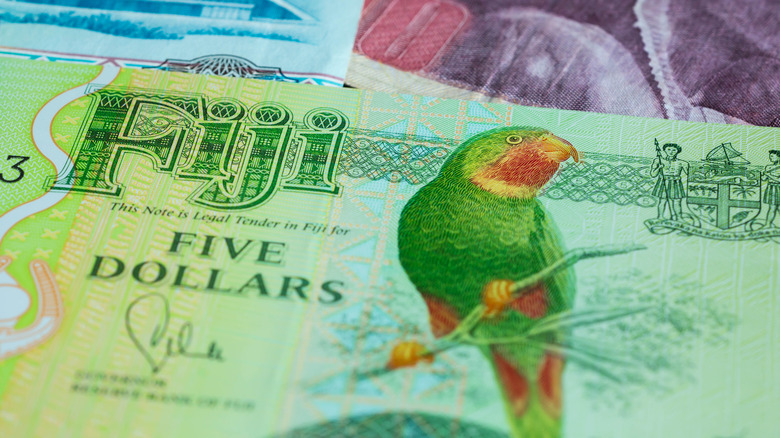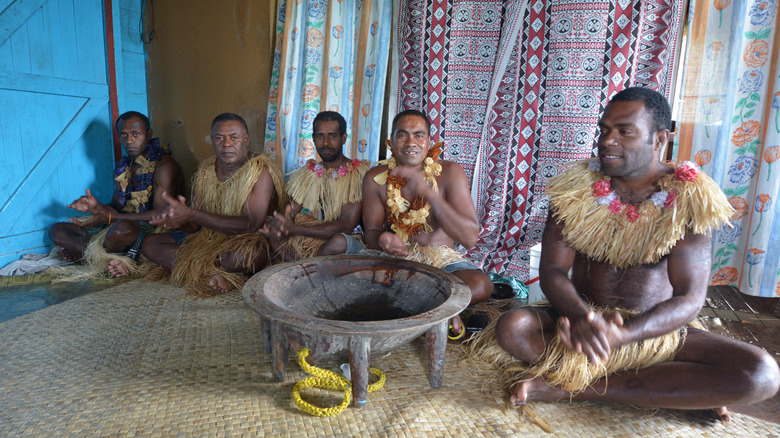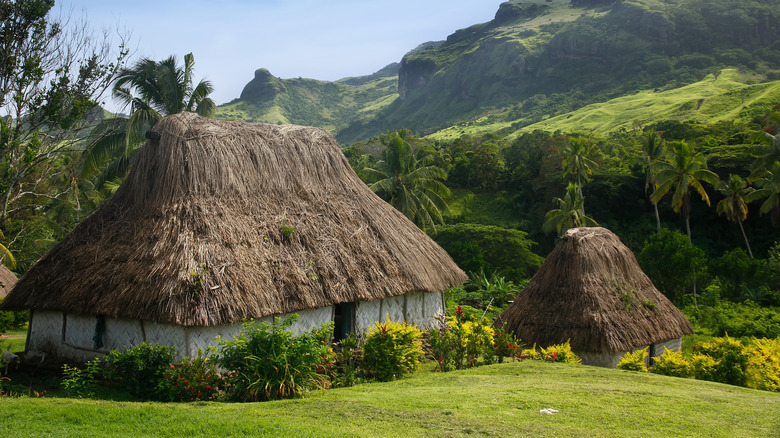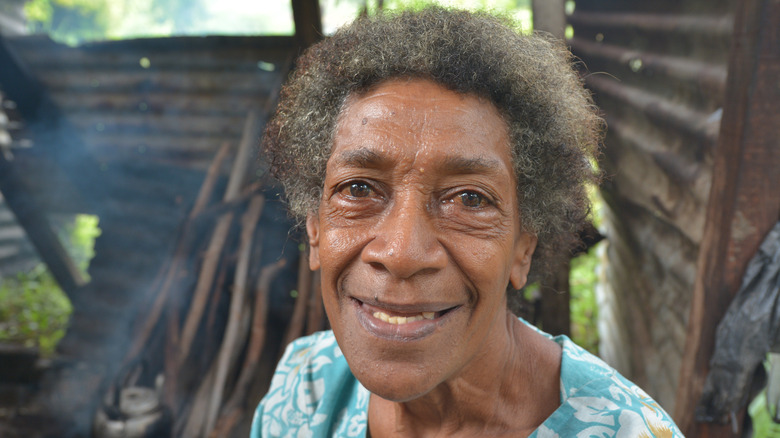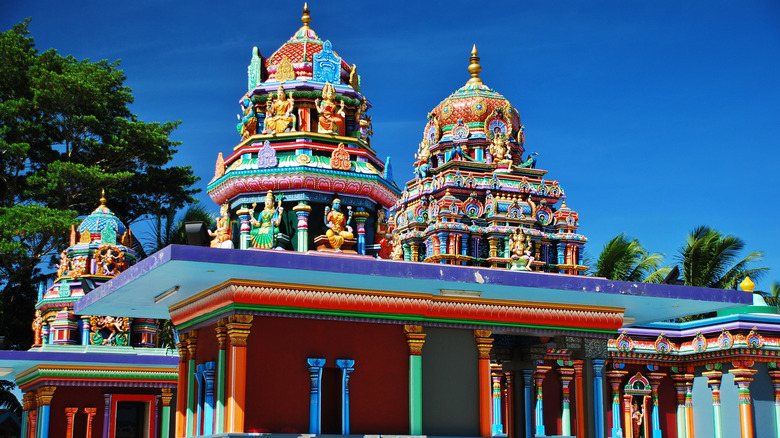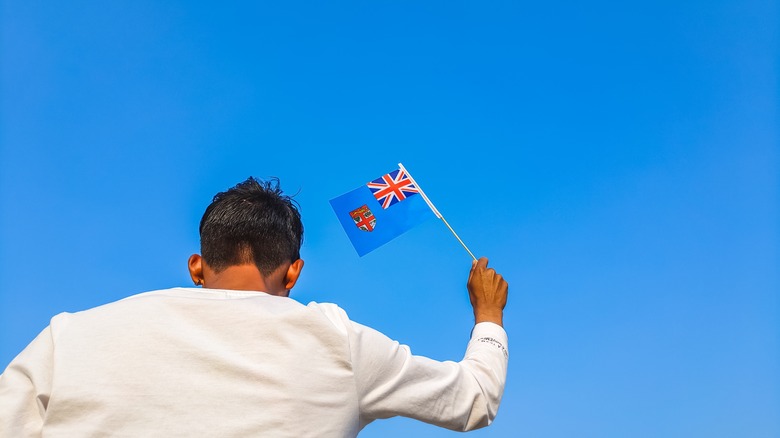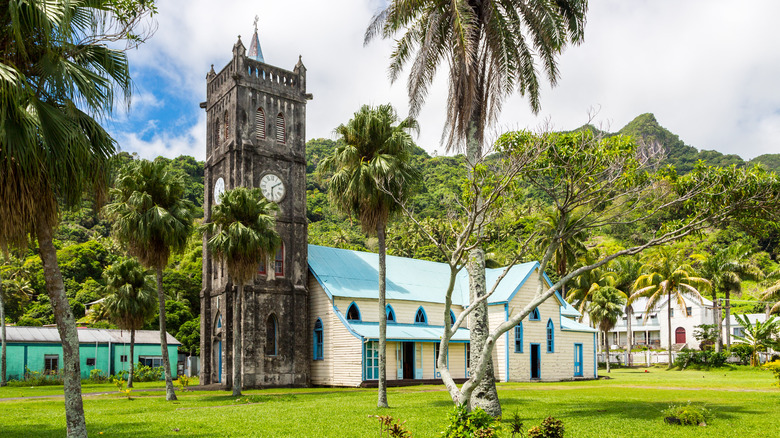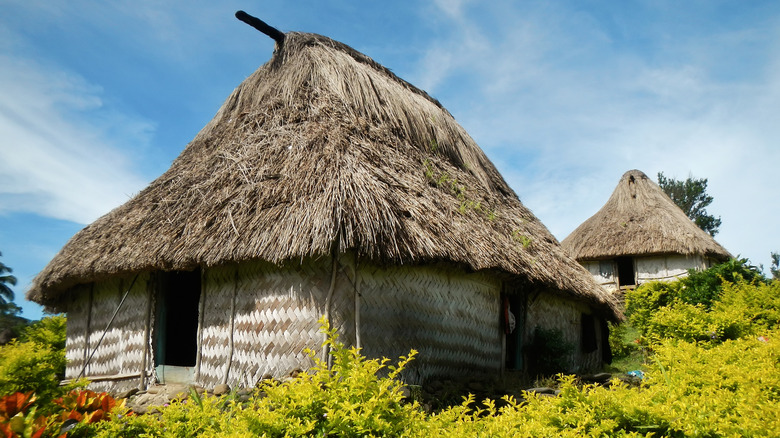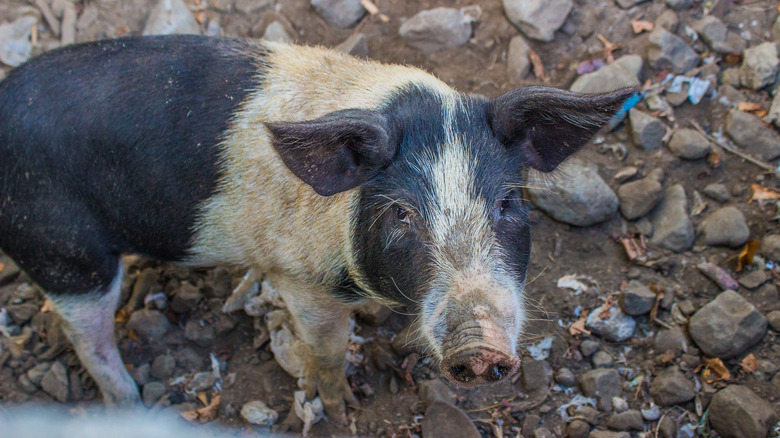20 Things You Need To Know Before Your Vacation To Fiji
A nation in the South Pacific, Fiji does a sublime job of physically embodying the words "tropical paradise." Tourists regularly see palms that lean above sugar-sand beaches and clear turquoise seas that host vibrant marine life. The sun often shines, the locals are usually smiling, and it's hard to surpass the hospitality — such is the warmth visitors will likely encounter on vacation. Just soaking up the simple life is one of the best things to do in Fiji.
All this makes it sound like a dream place to visit, but travelers need to be aware that Fiji has its own way of doing things, and visitors should expect a destination that is a joy to visit, but that's not like home. There are physical, cultural, and planning steps that a traveler will need to take, and brushing up on them beforehand will help to lay the foundation for an enjoyable, incident-free trip of a lifetime.
Don't speak loudly in public
While Americans have gained a bit of a reputation around the globe for the decibels they shatter when they open their mouths, talking loudly in Fiji is frowned upon. Residents across the U.S. might not think twice about conducting a phone conversation with enough vocal fortitude to be heard across the street. However, in Fiji, speaking loudly or in a raised or heightened tone is likened to anger. Even if you innocently sing the praises of a place or a dish at the top of your lungs, giddy with enthusiasm and bonhomie, a Fijian might take that as displeasure.
The only time you are likely to hear a Fijian shout is to get someone's attention, probably because that person is out of earshot. Try to speak softly and calmly in all situations — you'll note that others around you do. Also, refrain from cursing; it's not commonplace in Fiji.
Brush up on your rugby knowledge if you want to talk sports
For sports fans worldwide, soccer or basketball are often common touchpoints. The NBA is a global phenomenon, and soccer is the world's sport. But for Fijians, rugby rises above all others. You'll see it played all over the country, from kids on dusty fields to professional teams battling it out in stadiums that can hold thousands. "Rugby means a lot for us in Fiji, it just gives us life, it keeps everybody happy," Assistant coach Seremaia Bai shared with the Associated Press. "It keeps the country in unity. Everyone gets up early at three or five o'clock in the morning (to watch the games)."
Rugby is akin to religion, so visitors would be wise to take some time to learn about the sport, how it's played (don't ever say it's like American football), and some of the country's achievements. Fijian rugby players are known for their fast, relentless attack and exceptional ball-handling skills. They won the Olympic gold in sevens in the 2016 Rio Olympics and the more recent games in Japan. If you want to impress locals, drop in the names of some of Fiji's rugby greats, like Jerry Tuwai, Levani Botia, and the showman Waisale Serevi.
It's not just one island
The word "Fiji" might only have four letters, and by some simplistic logic, that might suggest that it's a single island, but that is far from the truth. Scattered across the South Pacific, the archipelago of Fiji has more than 300 islands, though only a third are inhabited. The main island of Viti Levu dominates the country, home to the international airport at Nadi and the capital city, Suva.
Fiji has a population of less than 1 million, with a quarter of its residents living in the capital, and the primary money earners are agriculture and tourism. Visitors will find a proliferation of seductive all-inclusive resorts in Fiji, many along the coast, some on their own private island. The nation also possesses an abundance of natural beauty. The islands are a product of volcanic activity, so mountains are customary, bringing a bit of visual drama to the scenery.
Tips aren't part of the hospitality landscape
Tipping is ingrained in American society for anyone working in the service industry — whether driving a cab or running the cash counter at a neighborhood bagel joint. Many service workers couldn't meet their daily, weekly, or monthly bills without the optional gratitude of customers, and tips of anywhere between 10-20% are part and parcel of everyday life there. But in Fiji, as in many countries worldwide, the custom of tipping is not expected.
That's not to say it isn't welcome, and Fijians will be pleased to receive your gratuities. Just know that if you don't tip a bellhop, waiter, or guide, they won't spend an eternity giving you the evil eye. Certain public holidays, or festive times of the year, like Christmas and Diwali, are times when your generosity of money and spirit will likely be significantly appreciated.
Never show up empty handed
If you stay in a resort, one of the excursions offered at the activities desk might be a visit to a local village. It's also easy enough to organize with a tour operator. If you decide to visit a village, which we highly recommend, never show up empty-handed, and always bring a gift. While that gift, known in Fijian as "sevusevu," can be many things, one surefire success is yaqona, a root used to make the drink kava.
A pricey product used in ceremonies, it's one item that villagers are increasingly reluctant to purchase themselves. Also, think about additional sevusevu for the children in the village, such as coloring pencils, sketchbooks, and even a rugby ball (of course!). "The constant small exchanges of favours and gifts ensure everyone is interconnected and no-one goes without," observed BBC features correspondent Diane Selkirk during a visit to a Fijian village. The gifts are usually given to the village headman as a mark of respect, though check with your guide to determine who the most appropriate recipient would be.
It has distinct seasons
The thing about tropical paradises, at least when we think about them, is that they are always idyllic, places where the sun constantly shines, and the sky is clear, save for the occasional puffy, languid cloud. That is true in Fiji — at least for part of the year. The country is a fabulous place to visit anytime, but it has a wet and dry season. The peak months, coinciding with the finest conditions, are from May through October, the period of late fall through to early spring (Fiji is in the Southern Hemisphere).
Travelers arriving between May and October will enjoy plenty of dry, sunny days and temperatures that hover around 80 degrees Fahrenheit. The rest of the year can be wet, sticky, and warmer, though downpours can be intense, and cyclones can form. If traveling with fewer tourists is a priority, consider the low, wet season. Whatever the time of year, the water is always warm.
The language might be tricky, but it's fun to learn
There are slight variations in Fijian all over the islands, but the language shares commonalities with Austronesian tongues elsewhere in the globe, from as far away as Madagascar and Hawaii. Fijian's combinations of letters and vowels may seem alien, but nobody expects you to learn the language if you plan to visit the country. Plus, many Fijians speak English, and Indo-Fijians often speak Hindi.
Even if Fijian isn't required for your trip, it's worth learning a few words and phrases, especially those you will hear repeatedly. It's also fun to speak the local vernacular. A word you will hear repeatedly as a tourist is "bula," which means hello or welcome, but can also be used as a toast and is part of the phrases for good day ("ni bula") and good evening ("ni sa bula"). Fijians are infallibly polite, and you should be too, so remember "yalo vinak" for please and "vinaka" for thank you. When it's time to leave, you'll hit them with a "moce" (pronounced moe-they) or goodbye.
The mosquitos carry dangerous diseases
Despite sporadic scares of West Nile virus and Zika in the United States, the skeeters are more of an irritant than a real concern. That, sadly, is not the case in Fiji, where the mosquitoes routinely carry dengue and Zika. These are similar illnesses (via Emerging Infectious Diseases), viruses transmitted by mosquitos that result in rashes, high fevers, and body aches, with possible fatalities. Sounds terrifying, for sure, and since there are no cures for viruses, only medicines and regimens that can help to reduce the symptoms, a traveler's best course of action is not to get bitten.
Fiji visitors should take precautions to minimize their exposure to these featherweight vampires. This includes covering up — wear long pants and shirts instead of shorts, skirts, and T-shirts, whenever possible. Favor light-colored clothing, use mosquito repellent, and avoid the creatures' most lively time of dusk through dawn (they don't like the sun and so come out at night).
Things don't run like clockwork
One of the joys of vacation is the chance to throw your schedule out of the window and not be governed by timetables and alarms. That said, sometimes you want things done at a specific time. Like in many tropical island nations, life in Fiji plays out slower, and things often take longer or get delayed. This is known as Fiji time, a temporal framework where urgency takes a back seat, and actions are completed when they are completed.
This can be a frustrating submission for A-type travelers, who demand clockwork precision planning. In practical terms, this can mean a taxi driver might not show up when you agreed, or a trip to the local village might occur at a different time than you were told. Treat Fiji time as just another continuum, and bake it into your daily routine on vacation.
Stock up on cash
In large cities, banks with ATMs are easy to spot and convenient places to withdraw the local currency. But in villages or rural areas, where you won't be able to pay with anything but cash, you aren't going to find a bank, let alone an ATM. So, if you plan to go into a rural area or a location with a small population, bring as much cash as you think you will need; if you are going there with a guide, ask them for guidance on how much that should be.
Also, note that most of the vendors in these areas will not accept payment by credit card. And they aren't set up for payment through a phone app, so cash is king. When getting cash from the bank, also ensure that you have a good stock of small bills, which are helpful for taxis, public transportation, and small purchases.
Kava is central to life
A drink made from a ground root, kava, or yaqona might not tantalize the tastebuds like a smooth mocktail, fruity wine, or hoppy beer. It does, in fact, taste like watery mud, but don't let that put you off because kava is a vital part of Fijian life, most notably in a kava ceremony. This ritual is a special treat you should consider participating in.
Making kava requires pounding the root of the yaqona and mixing that powder with water. Kava does not contain alcohol, but it does affect the drinker, bringing on a mild state of relaxation and happiness and numbing the mouth. During a kava ceremony, which is as much about the joyous coming together of people as the actual drink, groups congregate around a large bowl, with everyone seated on the floor. Guests drink in order around a circle from a cup made of a coconut shell, and the experience involves lots of clapping, "bulas," good cheer, and endless smiles.
It helps if you like to snorkel or dive
Not surprisingly, given its location — moored in the South Pacific, some distance from Australia or New Zealand — Fiji has some spectacular water. It is warm year-round and a joy to jump into. During the dry season, it's also beautifully clear, but to appreciate its mind-boggling clarity, travelers need to gaze beneath the surface to see the marine riches. There are many great diving and snorkeling destinations around Fiji.
Beqa Lagoon is easy to reach from the main island of Viti Levu and has a long reef with calm conditions de rigueur. Water babies might see seahorses peeking out from the eelgrass or spot rays and turtles while, further down, sharks and shipwrecks await. For lovers of soft corals, the Somosomo Strait won't disappoint — from the vertiginous depths of the Great White Wall to the proliferation of cabbage corals at the Cabbage Patch, which sits close to the water's surface.
Don't be overly effusive with praise
While showering someone with praise comes relatively easy to people in the U.S. — from gushing over a child's rudimentary artwork to complimenting a friend's questionable clothing choices — that ubiquity of praise is less prevalent in Fiji. In fact, praise can have negative repercussions. If you are in the home of a Fijian and see something that you admire or impresses you (a carving, a piece of furniture, a memento), praising it ad infinitum can suggest that you want it.
In this scenario, the Fijian host could feel that they have a responsibility to give the item to you out of politeness and hospitality, even if that was not what you intended. So keep the compliments mild and general — "You have a lovely home" is the kind of thing that should suffice. Furthermore, even when commending a child or giving them a friendly pat, never touch their head, which is considered sacred.
Respect all elders
Families are the cornerstone of Fijian culture, pyramidal structures where the highest esteem is held for those at the top — the elders. When it comes to the older generation, a simple way to show respect is to gently bow your head to them when you greet them. Refrain from touching them, however cute they may seem, at all times, as this is considered disrespectful.
You may only encounter an elder when you visit a house, perhaps having a meal there, in which case there are other customs you should be aware of. Fijians eat with their hands — always the right hand — and whatever food is on your plate should always be finished. You should also eat with your mouth closed, and if you want something from another part of the table, never reach over to get it, but point to it (not with a finger, which is also considered impolite, but with an open hand).
Don't proselytize, but honor the religions
Religion is not straightforward in Fiji, though Fijians generally respect all faiths. Christianity is the dominant creed in the country, with about 65% of Fijians following it. After this, the two main religious groups are Hindus (about 28%) and Muslims (about 6%), though there are small communities of Sikhs, Jews, and Bahai. While ethnic and religious tensions and conflicts arise, they are the exceptions, not the norm, and, by and large, Fijians of different faiths coexist peacefully.
If you visit Fiji and are incredibly passionate about your religion, don't push your ideals onto Fijians, but by the same token, you should show the utmost regard for their beliefs. The secular nature of Fiji is evident not just in daily life — you'll see Hindu temples in the same town as Methodist churches — but also in the public forum. Easter, Diwali, and the birthday of the Prophet Mohammed are all commemorated through national holidays.
Don't talk the country down
Fiji isn't a materially rich country, with an average GDP per capita of just over $5,000 (in the United States, the comparable figure is more than $70,000). While wandering around the country, visitors might notice many places where things don't operate as smoothly or efficiently as possible (making it no different from nations worldwide). But Fijians are very proud of their country, and pointing out its failings is bad form, even if it's meant to be a constructive comment or an avenue for inquiry.
With people you have just met or haven't had time to get to know well, don't try to analyze the problems of rural poverty or any inequalities that you might see. Fijians could take this as a snub of their way of life. They might also point out that things are not always as they seem and that material prosperity isn't necessarily the pathway to continued happiness.
Dress relatively modestly
As you might have gathered by now, Fiji is a conservative nation where the people are respectful, tolerant, warm, and kind. If you are spending time at a beach, which you probably will when visiting Fiji, wearing beach clothing is wholly appropriate. But when you are away from the sand, outside the confines of your resort, where casual attire is perfectly normal, or taking a trip to a village, dressing with a modicum of respect is crucial.
This means wearing clothing that covers the knee on the bottom half of your body, and any outfit on the top part should undoubtedly cover the shoulders. In a village, it's always inappropriate to wear a hat since the head is considered sacred; only the village head is permitted to have a head covering of any sort. Also, leave the sunglasses behind — Fijians like to look people squarely in the eye.
Try to do little on Sundays
Most Fijians are Christian, and Sunday is not only the day of rest; it's also the day of worship. Up and down the country, on that day, many locals will dress in their finest and head to church to pray, catch up with fellow parishioners, and spend time with family. This is also a day of rest for businesses, and many stores nationwide will be closed.
In tourist areas like Nadi, some shops that sell souvenirs or handicrafts to overseas visitors will be open, and generally, large supermarkets will operate with curtailed hours. Public transportation will continue, gas pumps will be available, and tour operators might arrange excursions that day, taking participants to the waterfall or on a boat trip. But if you're planning to do some serious shopping and want a selection of places to browse or visit a village, Sunday is not the day to do it.
Expect to remove your shoes at someone's home
Like in nations across Asia, the Middle East, and Europe, people in Fiji remove their shoes before they enter their homes. It's a sign of respect and a basic concept grounded in hygiene — who wants mud, grime, dirt, and germs from outside scattered all around their home? If you have the good fortune of being invited to the home of Fijian, you should plan on removing your footwear.
Don't make excuses that you can't because the shoes are too awkward to take off when, in fact, you are worried that your feet smell like a garbage dump. Your hosts will be more offended by your insistence on keeping your feet sheathed than any odor from them. Let your host welcome you inside, and then find a seat near the front door — don't look for a comfy spot deep inside the home and make a beeline for it, which would be disrespectful.
But be sure to wear shoes outside
While shoes are a no-no inside the home, wear them when you are outside, especially in rural areas. Choose a sturdy pair that covers your foot from top to bottom. Leptospirosis is prevalent in Fiji and can be transmitted through mud and wet soil, so protecting your feet is vital. Sometimes called Weil disease, it is a bacterial infection that lives in the urine of animals that carry it.
Villagers in Fiji often keep livestock that they will sometimes slaughter for food — pigs, cattle, and so on — under or around their homes. The urine of those animals seeps into the soil and mud by the houses. Even in the absence of livestock, the bacteria can be carried by dogs. Leptospirosis can have some nasty effects, similar to a bad flu — a fever, body aches, and chills — and, in extreme cases, can be fatal.
